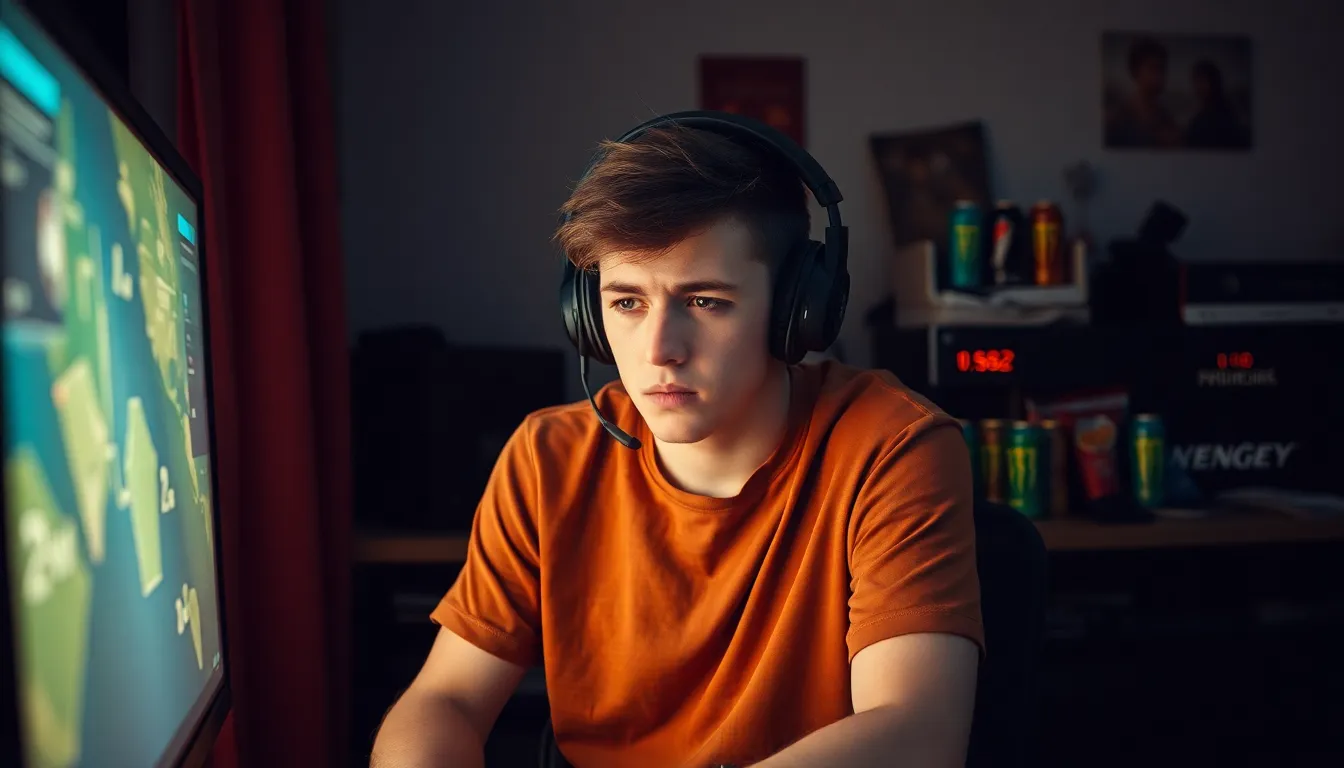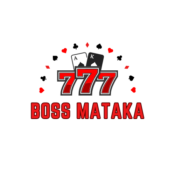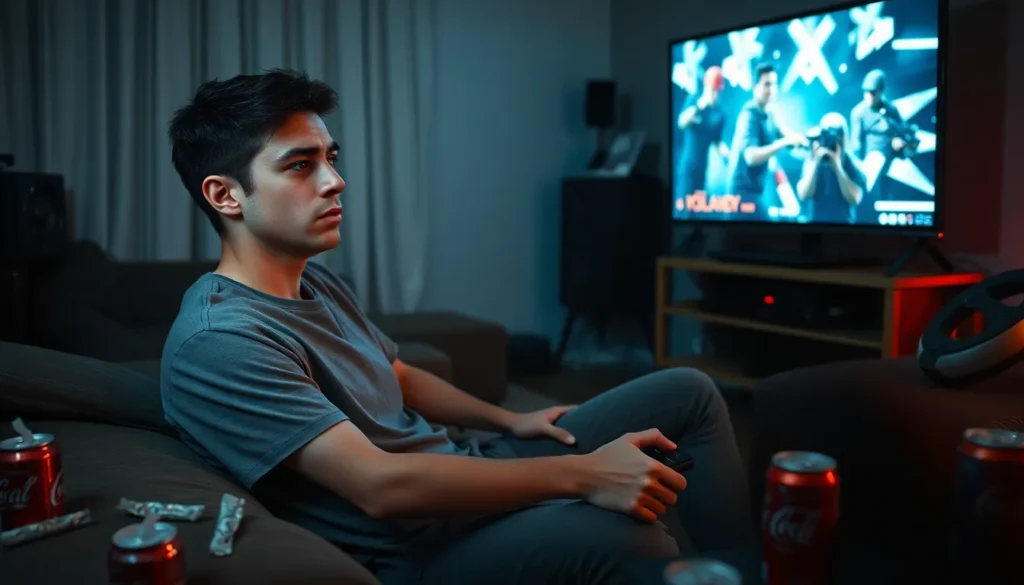In a world where gaming has become a way of life, the phenomenon of “game overdertoza addiction” is sneaking up on players like a stealthy ninja. One moment, they’re conquering virtual realms, and the next, they’re battling the very real struggle of losing track of time and responsibilities. It’s a slippery slope that transforms casual gamers into full-time residents of a pixelated paradise, complete with missed deadlines and laundry piles that rival Mount Everest.
Game Overdertoza Addiction
Game Overdertoza addiction refers to an overwhelming obsession with gaming that interferes with daily life. Gamers often develop an unhealthy fixation, prioritizing their virtual experiences over essential responsibilities.
Definition of Game Overdertoza Addiction
Game Overdertoza addiction manifests as a compulsive need to engage in excessive gaming sessions. It occurs when individuals prioritize gameplay at the expense of social interactions, work obligations, and personal care. This addiction can lead to detrimental effects on an individual’s mental and physical health, resulting in feelings of guilt or shame while neglecting real-life commitments. Identifying this form of addiction involves recognizing the impact of gaming behavior on overall well-being and functioning.
Signs and Symptoms
Signs of Game Overdertoza addiction include a notable increase in gaming hours, often exceeding several hours daily. Some individuals may experience withdrawal symptoms, such as irritability or anxiety when unable to play. Neglecting important tasks, like homework or chores, becomes common, as priorities shift toward gaming. Furthermore, social relationships may deteriorate as gamers isolate themselves, choosing virtual interactions over real-life connections. Recognizing these symptoms can lead to timely intervention.
The Psychological Impact


Game overdertoza addiction significantly affects mental well-being. Individuals often experience heightened emotional turmoil as they navigate their obsession with gaming.
Emotional Consequences
Feelings of guilt frequently arise in gamers neglecting responsibilities. Overwhelming shame often accompanies missed deadlines and ignored relationships. Anxiety often spikes when gamers find themselves unable to play, leading to distress. Many experience mood swings, where happiness from gaming contracts with sadness from real-life neglect. The inability to engage in social settings stems from this emotional clash, isolating individuals further. Chronic gamers find their emotional health deteriorating as they prioritize gaming over relationships and personal fulfillment.
Behavioral Changes
Compulsive gaming results in drastic behavioral shifts. Increased gaming hours diminish time allocated for social interactions and essential tasks. Players may skimp on day-to-day responsibilities like work or school. Withdrawal from real-life connections often occurs as virtual relationships take precedence. Daily routines adjust, with some gamers choosing late-night sessions over sleep. Neglecting self-care becomes common, as personal health deteriorates in favor of virtual achievements. These behavior patterns worsen over time, locking individuals in a cycle difficult to break.
Causes of Game Overdertoza Addiction
Various factors contribute to game overdertoza addiction, significantly affecting individuals’ gaming habits.
Social Influences
Peer pressure and social circles play crucial roles in this addiction. Friends who frequently engage in gaming can influence others to join in, fostering a sense of belonging. Online gaming communities often promote continuous play, creating an environment that rewards excessive gaming. Social media platforms amplify this influence by showcasing gaming achievements, making competition and comparison prevalent. The desire to fit in or achieve recognition can further intensify the urge to prioritize gaming over real-life responsibilities.
Personal Factors
Individual characteristics also contribute to game overdertoza addiction. A tendency towards escapism often drives gamers to seek refuge in virtual worlds, especially during stressful periods. Low self-esteem can lead individuals to find validation in gaming accomplishments rather than real-life successes. Emotional struggles, such as anxiety or depression, may result in gaming being perceived as a coping mechanism. In these situations, gaming provides temporary relief, making it increasingly challenging to break free from the cycle of addiction.
Treatment and Recovery
Addressing game overdertoza addiction requires a multifaceted approach, focusing on both professional help and self-help strategies.
Professional Help
Seeking professional help often plays a vital role in recovery. Therapists specializing in addiction can provide tailored treatment plans that address underlying psychological issues. Cognitive-behavioral therapy effectively helps individuals identify negative thought patterns while developing healthier coping mechanisms. In severe cases, support groups offer a community for individuals facing similar challenges, fostering accountability and connection. Medical professionals may also recommend interventions to manage anxiety or depression tied to excessive gaming. These resources aid individuals in navigating their recovery journey.
Self-Help Strategies
Implementing self-help strategies can significantly aid in overcoming game overdertoza addiction. Setting strict gaming limits encourages healthier habits, as individuals can define specific hours for gameplay. Engaging in alternative hobbies provides constructive outlets that redirect focus away from gaming. Practicing mindfulness helps manage cravings and reduce anxiety, fostering present-moment awareness. Establishing a schedule prioritizes essential tasks and social interactions, counteracting isolation. Building a support network of friends and family promotes accountability and reinforces positive behavior changes. By consistently applying these strategies, individuals can regain control over their lives.
Restore Their Mental and Emotional Well-Being
Addressing game overdertoza addiction is essential for reclaiming a balanced life. Individuals must recognize the signs early and take proactive steps towards recovery. By seeking professional support and implementing self-help strategies, they can break free from the cycle of excessive gaming.
Building a supportive environment and engaging in alternative activities can foster healthier habits. It’s crucial to prioritize real-life responsibilities and relationships over virtual escapism. With determination and the right strategies, individuals can overcome this addiction and restore their mental and emotional well-being.

